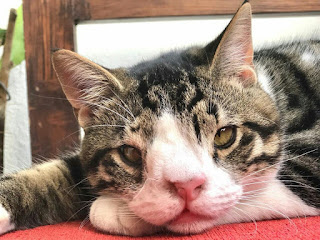Can Cats Have Down Syndrome?
Short answer: No. Here’s why. Cat Down Syndrome is by definition an additional chromosome within the Chromosome 21 pairing in humans. Humans have 23 chromosome pairings where a cat only has 19. No 21st chromosome pair means no anomaly therein pairing.
Cats simply don’t have enough chromosomes to possess what can properly be called mongolism . While some cats may display a number of symptoms like mongolism , the cause could also be another genetic fluke, poor nutrition or simply the cat being herself.
Down Syndrome Signs In Cats And Kittens
A cat or kitten may exhibit a number of the symptoms a person's with mongolism does. An undergrown kitten who isn’t reaching all the developmental milestones could also be affected by malnutrition or a genetic condition. Inbreeding and other factors can cause a cat to possess mental and physical abnormalities.
Anemia and other blood disorders could also be thanks to parasitical infection or malnutrition. As for physical appearance, not every cat goes to evolve to breed standard. The CFA won't give cats with droopy eyes, flabby muscles or a stick out tongue any prizes, but they’re still good cats. An unusually clumsy cat may have a nervous disorder and will be seen by a veterinarian.
Care for Cats with Feline Down Syndrome
There is a disorder unofficially referred to as feline mongolism . Cats can have chromosomal imbalances and will be screened by a vet. Blood work, genetic testing and x-rays can determine what specific healthcare needs your pet has. Keep in mind, that each cat is exclusive , both in looks and behavior. A cat with a neural disorder has got to be taken care of in order that she doesn’t hurt herself together with her clumsiness.
Many of the ill affects of a disorder in cats are often mitigated with a natural diet and vitamin supplements. Keep in mind that only a veterinarian can diagnose an animal with any illness. Always consult a veterinarian before changing your cat’s diet.
Cerebral Hypoplasia
When parts of the cat’s cerebellum aren't completely developed this will mean a kitten can have trouble standing and walking. Along with general clumsiness, a cat with cerebral hypoplasia will often bob their head and have leg tremors.
The cause are often malnutrition, poisoning or a defect from birth. There is no treatment for this developmental disability. It can only be managed by seeing that the cat doesn't accidentally harm herself.
Klinefelter Syndrome
This is a genetic condition where a male is born with an additional X chromosome . On the occasion that you simply find a really rare male calico, he will almost certainly have Klinefelter's syndrome . He won't require neutering as Klinefelter's syndrome causes sterility.
He may exhibit some odd behaviors like trying to entice other males to mate with him. Otherwise, he’ll be a relatively normal cat.
Distal polyneuropathy
This is a standard sort of nerve damage related to DM , often related to pain or numbness within the feet. Paralysis, seizures, tremors, an unsteady gait and weakness are all common symptoms. Distal polyneuropathy are often diagnosed through blood work, urine sample or electrophysiology.
Electrolyte therapy and nutritional support are effective treatments, though chances of recovery depend upon the underlying cause. If the cause is an allergy , then the cat will just be separated from whatever is triggering the reaction. Cats with congenital polyneuropathy aren't expected to measure very long.
Feline Dysautonomia
If the autonomic system that effects the urinary and gastrointestinal tracts fails this will cause distension within the esophagus, bowels and bladder. Along with these swellings and droopy eyes, a cat with Feline Dysautonomia (also referred to as Key-Gaskell syndrome) may suffer incontinence, weight loss, depression, loss of appetite and a dangerously slow heart rate.
Diagnosis may require a and your vet can also want to see for the leukemia virus. There is no cure for feline dysautonomia, only treatment for the symptoms.
In conclusion
While it's not in the least possible for a cat to possess what could legitimately be called mongolism , the symptoms related to it might be some cause for alarm. While every kitten develops at their own unique rate, one that’s severely behind may have to be screened for other ailments.
In any case, confirm your cat is eating well, only eating what she should and getting regular veterinary check-ups.





Comments
Post a Comment